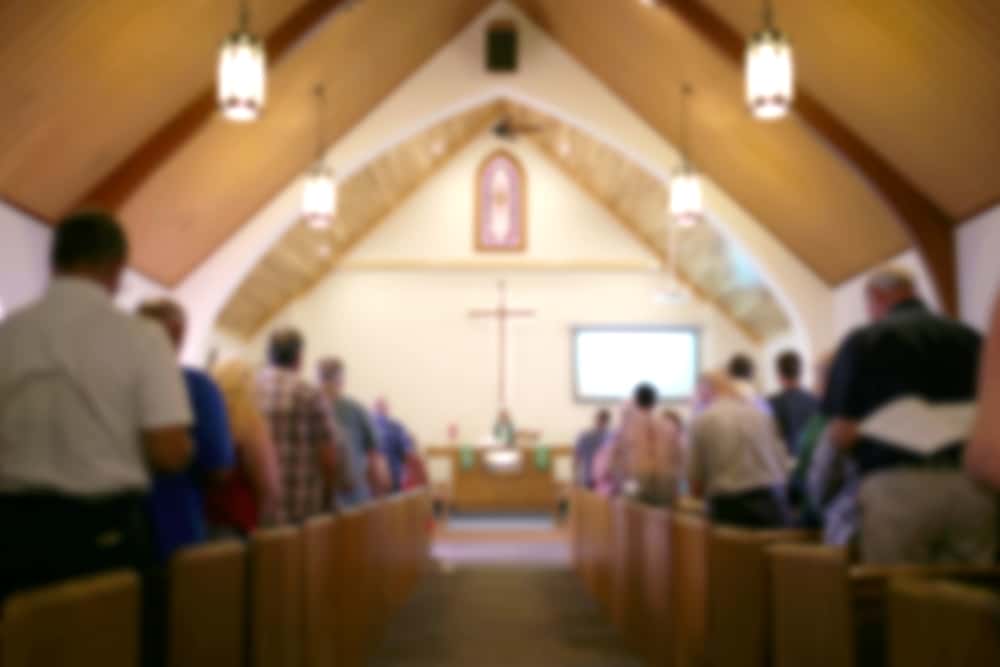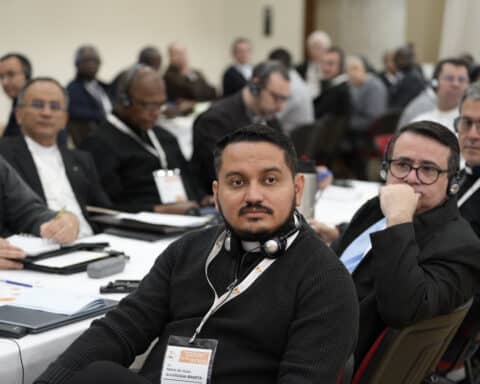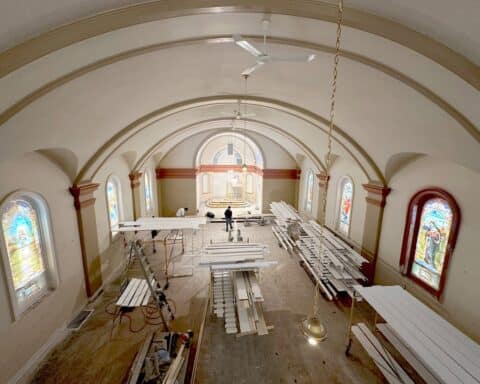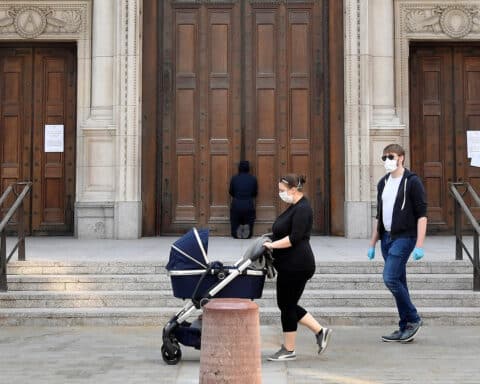I lost the “gallbladder challenge,” as my doctor called it. After eating a very greasy meal, I ended up with what I thought was a really bad stomach ache, but when I woke up at 1 a.m. and couldn’t go back to sleep, I started to think it was something worse. Instead of doing the right thing (in this case, going to the hospital) I took some medicine and waited. Then I waited some more. I told myself I shouldn’t wake up my wife, because if it was nothing, then she would lose a night of sleep. But things only got worse for the next six hours of rolling around on the couch. By the time I got to the hospital, they shot me up with morphine, and just a few hours later, I was in surgery to get my gallbladder removed and a bile duct cleared out. Looking back, I could have avoided a lot of suffering if I had only made the difficult and better decision to deal with what was causing my pain earlier on. Instead, it took a radical approach to make me healthy again.
The Church in the United States is also hurting. We are losing people in droves. Mass attendance is at an all-time low, even though the pandemic restrictions on gatherings have been eased in most places. Catholic institutions are shrinking under our watch, and with each passing year, the decline is speeding up. The younger the generation, the lower the percentage of Catholics there are. We are past the point of debating whether something is seriously wrong, and now we just need to make a decision: Will we go to the hospital to get surgery and recover, or will we just deal with the pain for a bit longer? Minor changes will not avoid the need for a radical approach.
Still, in many of our parishes, it seems like we just want to take some medicine and try to wait things out, rather than making the difficult decision to just take out the things that are causing the pain. So, we run the next program, turn to a different curriculum, put on more events and hope for the best. We keep doing the same (or similar) things that we have done for generations, but this time, we think, it may have a different result. When it doesn’t, we ask ourselves: Where did it all go wrong? Yet that is the wrong question to ask. The better question is: What are we willing to do to not only deal with the pain but become healthy again?
The ironic thing is that in the midst of the greatest pandemic any of us have ever experienced, we have an opportunity to help our parishes get healthier. Just as many of us reset our healthy habits during lockdown, our parishes can go through a similar process. But, just like a reset in our personal health is never easy or quick, neither is choosing to work on parish health. It takes a series of difficult and ongoing decisions. What I humbly offer below are some suggestions (not answers) on how we can work to reset our parishes and become healthier for the long-term.
1. Go to the (Divine) Physician
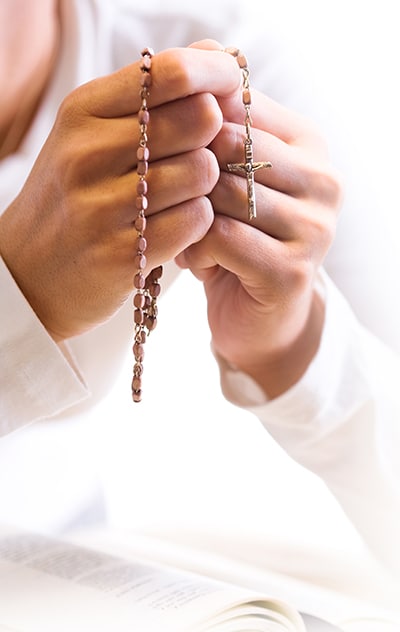
God alone can heal what ails our Church — and us. In fact, as the Divine Physician, he longs to heal us. Yet just like I had to decide to go to the hospital, God waits on us to decide to go to him. He waits for our permission to start the healing. Parishes also need to tap into the healing power of God himself, in intimate relationship with the Holy Trinity, through prayer. Without prayer, we are powerless to make a difference in the Church or in the world.
I suggest that parish leaders start by building an intercessory prayer team that can pray for specific intentions for the parish reset. Pray for vision. Pray that spiritual obstacles are removed. Pray that hearts are transformed. Pray for boldness. Pray that the strongholds of the enemy in the parish are broken. Invite the Holy Spirit to lead the parish. While this intercessory prayer team is regularly meeting to pray for these intentions, they need to stay in touch with parish leaders, especially the pastor, so they can communicate the needs of the parish and what prayers have been answered.
We aren’t going to renew our parish culture with human strength alone. Sustained and daily prayer, from both individuals and the community, is the key. This is the kind of prayer that first changes your own life and then spills out to change the lives of others. Furthermore, it can’t just be your own personal prayer, but the prayer of the entire parish. If you want to grow, change and reset your parish, then don’t fall into the lie of thinking it will happen merely on your own efforts. Rather, God is the one who changes hearts. So, invite him in, as a community.
Furthermore, a communal process of discernment is needed. Not only do the parish leaders need intense and ongoing prayer with one another (more than just opening and closing a meeting with prayer), they also need to know how to discern where God is leading the parish. I believe St. Ignatius of Loyola gives us a wonderful tool in his discernment of spirits. These rules of discernment can be applied in a process for the parish to learn to listen for the voice of God as well as the voice of the enemy. Then we choose the good spirit, not the evil one, even when it is difficult to do so.
2. Properly diagnose what ails us
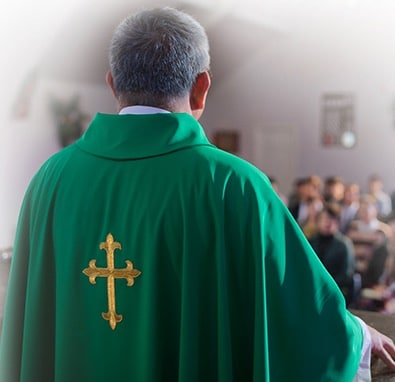
This prayer and discernment leads to our next step. When we are sick, we need to know what ails us in order to get the right treatment. The same applies with our parishes. If we don’t know what our problems are, we can’t work on them and become healthier. The purpose of a parish is to be a place where missionary disciples are formed and sent out into the community to make other disciples. How are we doing in this? Are we really forming our people for mission in the community? Are we transforming lives by our programming? Do we even know how to make a disciple or form them for real evangelization? Is our time, money and planning done with intention, or is it something that is carried along with the current culture of “the way we do things”? These are tough questions that can start the diagnostic process.
We also have to admit that some things we do aren’t working. We can’t just give a canned presentation or show a video and think it will work on modern post-Christian people. The vast majority aren’t showing up to church unless it is for a wedding or funeral. Much less do they understand sin, redemption, God or even their own identity or purpose. We can’t make the assumption they share our understanding of the simplest of Christian concepts. Thus, our proclamation of the Gospel must be contextualized for modern people, without diluting our doctrines or truths. This takes persistent storytelling and many different avenues for people to hear about what Jesus has done. Primarily, we need Catholic disciples who evangelize naturally in their lives, not just in programs at church. This will require a drastic change in our habits, language, vision, priorities, budget, staffing time and, ultimately, our culture.
Only transformed people can reset the culture of a parish. Only transformed people can be the instruments that God uses to transform another person. Until you are transformed yourself, then how can you expect to transform those around you? Until there are others who are also transformed, working on the same goals (evangelization, discipleship, growth through conversion of the lost, etc.), then how can you change the culture in your parish? You can’t. So, while you keep the larger vision in front of you, do the hard, daily work of investing in others, building relationships, winning trust, proclaiming the Gospel, aiming for conversion, etc. Then watch the fruit start to roll in through the years. If you want to build these skills, then find those who have done it before you and learn from them.
Pope Francis calls this “pastoral conversion.” Pastoral conversion starts with leaders who know, love and follow Jesus. It then grows into a conversion of practice. How we reach the lost, heal the wounded, cast out evil spirits, convert the lost and build up the Church is rethought, renewed and, ultimately, reset. It isn’t a rethinking of why or what but, rather, how. How we do these things is put under the light of holiness, prayer and Scripture. We look at what has worked in ages past, we look at the current state of things in the wider culture and our parishes, then we apply the truths to our time and place. Thus, our pastoral “how” of parish ministry.
3. Work on building healthy habits

If a parish is going to go through the process of a reset that leads to better outcomes, then it needs visionary leadership by those who know how to properly lead a group of people. Healthy leaders are able to build healthy parishes. This means that our leaders need to be in a good place mentally, spiritually, emotionally, relationally and physically in order to lead well. While leadership is primarily a learned skill, not a natural one, even good leaders can form both healthy and unhealthy habits. Leadership is built on habits that we have to work on — for if we fail to work on them, we will fail as leaders.
Being able to cast a vibrant vision is one habit of being good leaders. Where are we going? How will we get there? What is the process of parish transformation we will go through? What strategy, resources and tools will we use to help us accomplish our goals? What structures need change to get us to our destination? What do we have to stop doing? Healthy visionary leaders help the community find the answers to these and many more important questions.
Without vision, a leader doesn’t know what they are aiming at. Without vision, a leader can’t point those they lead in the right direction. But here is some good news: Jesus already has given us a vision and mission for the Church — to make disciples of all nations. The job of a Catholic leader is to take what Jesus wants of us and apply it in a particular context, not completely rework it. And here is the bad news: Few Catholic leaders know how to cast a vision and then get others to buy into it. Still, this isn’t an insurmountable problem but a skill that can be learned, especially if you have someone who has done it before to coach you through the process.
After a vision is cast, the next healthy habit is to foster a process of continued growth during the reset. But, be cautious of accepting busyness over fruitfulness. Good leaders with the wrong vision or mission may gather crowds, build new buildings, grow budgets, do lots of busy things at church, run a lot of programs and events, but they still may watch their parishes stagnate or even shrink. Why? Because while they may certainly be leading those that come to them, they may also be leading them in the wrong direction. Furthermore, they may only be leading those that would be coming to church regardless of what was going on.
The mark of success for every Catholic parish, diocese, ministry and institution is not found in the number of groups, the growth of income, the hits on a website, etc. The true mark of success is whether or not mature Catholic missionary disciples are being raised up and whether they are turning around and raising up even more missionary disciples like themselves. Until we actually believe this is true and start aiming at this goal, we will continue to decline. Healthy pastoral habits help us avoid this.
4. Form a healthy lifestyle (or culture) for the long-term
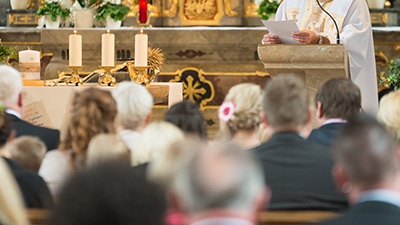
A parish reset takes a long time. While a change in priorities and habits can happen relatively quickly in some individuals, change of a large group rarely does. Be ready for the long haul. While some things might happen quickly and easily, true and lasting transformation of a parish will take many years.
Volunteering in a parish can be frustrating. Working for a parish can be very hard. Yet even harder is resetting parish culture. Dedication, prudence, perseverance and patience are all key. Since there are no magic bullets (you will need to admit there are none to move forward), every Catholic leader who wants to be a transformative leader needs to know that culture reset is a long-term project, yet it is worth every headache you will ever run into.
Think of how little fruit the average Catholic parish in the United States produces in comparison to what it could be doing. Are they without any fruit? Of course not. But, the mission of a parish is to be a source of God’s love to the wider community, to make disciples of everyone in the local area, to offer salvation and mercy to the Catholics who come to Mass as well as every other soul that is currently outside communion with Jesus and his Church.
Are we achieving this goal? If not, then what will it take to get there? Are we committed to the long-term efforts it will take to make this a reality? Is salvation of others our priority or not? What are we willing to do to change the status quo? These questions and many more help us determine if we are really ready to reset the culture or if we are just managers of decline in the Church.
5. It is easier to be healthy when you have support
When you want to change an unhealthy habit into a healthy one, it is easier when you have others around you to support, encourage and help you. The same is true when you want to reset a parish. Right now, due to COVID, most people feel more isolated than ever before. Mental health issues are at an all-time high. People are lonely. The Church, if we do what we ought, can help this problem.
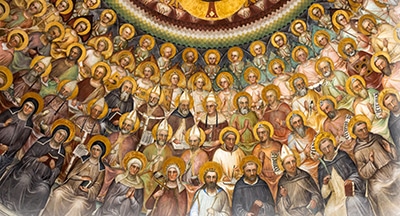
Working on building a genuine Catholic community isn’t easy and takes a lot of hard work. It takes folks who invest in one another (and the community) for years; people who aren’t going to parish hop when things get bad, just like you don’t leave the house because of a few arguments; folks who are going to reach out and take initiative to serve others; people who are willing to invest deeply in a handful of others, then influence more.
Still, community is not only friendship, and friendship is not only community. There is interplay between the two, but they are not the same thing. Community is wider; friendships are more narrow. Friendships are formed within a community, yet not everyone in a community needs to be your friend. While we are called to love and serve all in the Christian community, we don’t have to be close to everyone. So we can now see that the community is not just about me and my friends. It is about the larger “we” — all of us, even some that we may not get along with and love anyway. Just like the fact that siblings have to grow up in the same house, and it is good for them, we need others that challenge us. This is why we need a community that is larger than just friends.
We can’t be a part of Christian community and live apart from Jesus or others. We need to have a bigger picture, and part of what parishes need to do is try to foster authentic community and not just events and programs. These things can help start a community, but without intentional leadership that has a vision for the long haul, it probably won’t happen.
Catholics understand the need for others. We rely on the saints and leaders of our Church to help us understand prayer, theology, Scripture, the sacraments, etc. In the same way, we need to mine the depths of the great Catholics who have come before us in terms of community. Beyond the content of the Faith that they taught, how did they live, serve and pray together? Let us learn and live those things out and the community will follow.
Love. Authenticity. Intimacy. A proper vulnerability. Growth. Prayer. Things that are hard to carry and we do it together. Thus, a community where we can learn to be saints, together. Where we can love Jesus, be challenged to grow, pray together, live side-by-side and serve each other. This is a community. It is messy and necessary.

6. Every parish needs an ongoing plan of health
As a culture and as individuals, we are drowning in information. Yes, we have many amazing resources at our fingertips, and this goes for Catholic content as well. It is truly overwhelming and sometimes hard to find our way through it all. Yet we all know that access to a resource isn’t always the answer. I know many parishes subscribe to some of these resources, give away books, bring in a speaker, or host a conference or parish mission, among other things. Yet, these can only accomplish what they are meant to accomplish. They can’t help a parish recover from decline due to the pandemic (and culture change) in and of themselves.
No conference can make ongoing relationships flourish. No book can look someone in the eye and walk with them through suffering. No video series can change our parish culture problems. So, when we improperly use a resource, we can’t blame the resource for the failure to secure the outcome we wanted. Thus, we need a shift in how we use them.
We need to aim for transformation first. Then we should form.
The unspoken assumptions we have in our Church are revealed by how we operate. For instance:
- Not every person coming to Mass is in the same spiritual place, so why do we think one book we give to everyone will fit all their needs?
- Not every person in our parish is a disciple, so why do we say “everyone is welcome” to an event that ought to be aimed at disciples?
- Not every non-Catholic is ready for a formal formation process, so why do we send them to RCIA as the first step?
The reason this happens is because we have a current culture in our Church that has accepted that informing is easier than transforming. Catholics are good at informing, but not as good at leading others to transformation. We can teach, but don’t know how to assess where someone is spiritually and (even more importantly) to respond appropriately. These are skills that can be learned, but a parish reset will not happen by accident. Thus, we need to grow as Catholic leaders in our own skill and knowledge before we can count on large-scale transformation in others.
Don’t get me wrong, we are blessed to have all the resources we have. But, we have to understand that most people today will reject the information until they have experienced transformation.

Healthy parishes after a COVID reset
COVID is an opportunity for our parishes and us, and it is one that God doesn’t want us to waste. It is an opportunity to change how we do things. Why we do things and what we do isn’t different. The real question is whether or not we will take advantage of this opportunity. That is for each of us to decide.
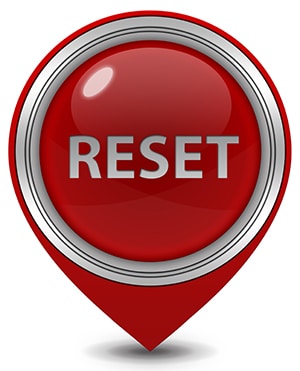
Change isn’t easy. Transformation isn’t easy. But our God is a God of renewal and conversion, who desires to lead us somewhere better than where we currently are. If we let Jesus lead the reset of our parishes, we must also allow him to reset us too. It starts with humility and prayer. We can then really discern what each of us needs, in order to grow as Catholics. We need the proper vision. We need help.
God wants renewal in our Church, so that we can be his healthy body in a world that desperately needs his grace. Remember that a handful of disciples changed the world in a few generations after Pentecost. What about us?
Marcel LeJeune is the president and founder of Catholic Missionary Disciples (CatholicMissionaryDisciples.com).

